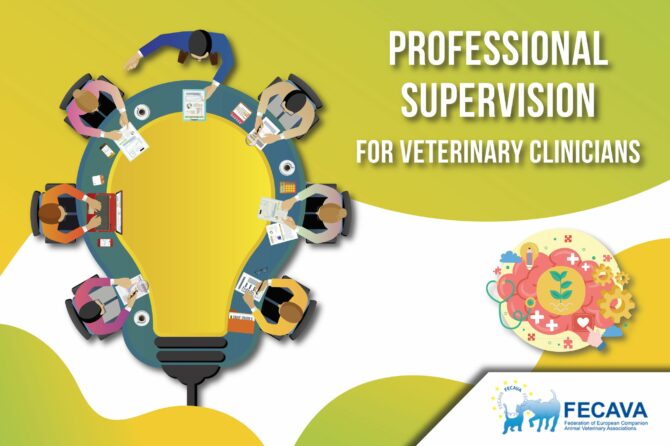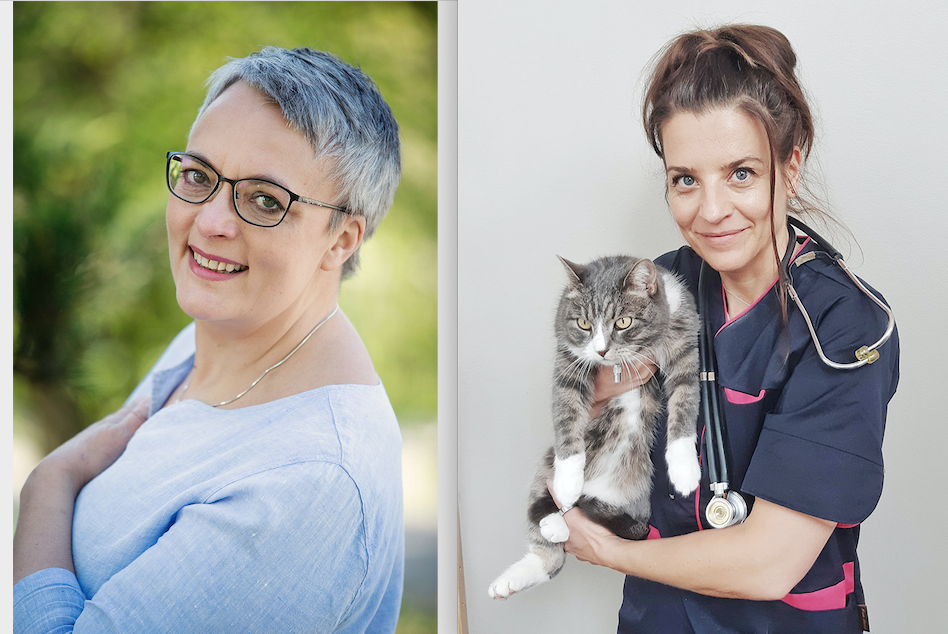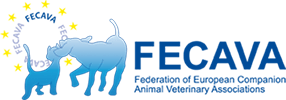
Professional Supervision as a means of Support for Veterinarians
Professional supervision provides an opportunity to reflect on work-related issues. It is a personal form of work-life support that has many dimensions.
It is not easy to define professional supervision in just a few words. Professional supervision is used for very different needs and the goals are always individual. The supervisor does not advise or present solutions but rather attempts to clarify the client’s thoughts and helps her to see things in a new way, from different perspectives.
Professional supervision offers an opportunity for the clients to take time to reflect on things that preoccupy their minds. Work supervision is one of several forms of support in the work-life, as are coaching and mentoring. While mentoring focuses on the actual job, the skills, and practices, coaching usually has a specific goal and an aim to achieve that goal. Supervision, on the other hand, usually has a more personal and long-lasting approach.
Professional supervision can be carried out both individually and in groups.
In individual supervision, the clients can reflect on their ways of working and look for new, more fruitful ones. It can be a good opportunity to go through difficult customer situations, to think about one’s resources for maintaining resilience, or to clarify priorities and schedules. Often supervision is also about venting emotions and reflecting on underlying fears and uncertainties.
In group supervision problems that challenge the work community can be addressed and made visible to find solutions. With the help of the supervisor, the discussion stays constructive and produces results. The goals of group counseling could be: consolidating the atmosphere, clarifying work tasks to improve efficiency, improving intra-community communication, or increasing employee resilience.
When counseling management professional supervision offers the manager an opportunity to express their feelings about work-related issues as well as analyze their leadership and role as a supervisor. They can receive support from the instructor to help mirror their strengths and weaknesses.
If you do not change anything, nothing will change.
Work supervision should be considered when you have recurring problems at work for which you have difficulties in finding a solution. Above all, work supervision is a place and time to reflect on what you are doing and for checking your direction. Solution-focused work supervision is a goal-oriented activity that strives towards the desired state of being. Once the targets have been set, different methods will be used to achieve results, and indicators by which progress can be monitored can be considered. The development of the client is discussed during each session. Work supervision aimed at changing things requires commitment and active, mid-level work from the client.
Requirements for professional supervision are finding a suitable supervisor and committing to the process. Many supervisors specialize in a particular field based on the supervisor’s own work experience. Knowledge of the client’s field is not always a prerequisite for good guidance, an external supervisor may successfully question the prevailing beliefs in the field.
Costs of work supervision
An employer who invests in well-being at work can provide his or her employees with work supervision to support their work. It can be done continuously or for a specified period. Job supervision can also be acquired independently and at your own expense.
In Finland, work supervision is continuous for professionals who perform demanding emotional work. For example, for a large number of veterinarians in Animal Welfare, professional supervision is automatically included in their work description. Regional location is not an issue, as remote supervisions have become more common recently during covid-19.
From self-deprecating to self-compassion
Professional supervision has opened our eyes to the fact that, although the veterinary sector often has an excellent framework for getting the job done, there is very little focus on supporting and maintaining well-being at work. It is surprising to what extent the demands and expectations veterinarians place on themselves are reflected in well-being at work. The high demands vets put on themselves can result in exhaustion and insecurity regarding their competence. Lack of self-compassion and failure to set limits for workload, customers, etc result in negative thoughts and feelings of inadequacy. Excessive inner demands, combined with the ever-increasing demands at work and customer expectations, are a major concern for the resilience and mental well-being of veterinarians. Being continuously under much pressure narrows the mind and hopelessness is close at hand.
The prerequisite for coping in working life is taking care of one’s well-being; focusing on oneself and making sure there is more to life than work.
Self-examination provides new ways to see oneself and the world around us. New and different views put things into perspective and help break down persistent and damaging thought structures. Compassion for oneself does not preclude professional development and/or self-challenge. Translating your internal speech into understanding, supporting, and encouraging yourself would solve many problems and bring joy to the work-life. Even if you face difficult and demanding situations at work, there can still be carefreeness and joy in the work community, pride in success, and appreciation of one’s achievements. Veterinarians have a wide range of abilities to solve problems in everyday work tasks: apply, negotiate, innovate, combine. When these abilities are brought to meet the challenges of one’s work and work community, one is closer to a more sustainable working life.
From veterinarian to work supervisor
Three years ago, a discussion on occupational well-being was started in the Finnish veterinarians’ Facebook group. The discussion was flooded with comments. The comments raised the issue of coping with problems and, in some cases, unsustainable pressures, as well as doubts about one’s professional competence. The discussion led to a process that began as a messenger discussion between us authors and ended with us applying to supervisor training in the spring of 2019. We graduated as supervisors in the summer of 2021.
We have both worked for a long time as vets and gained experience in various jobs within veterinary medicine. Throughout our working lives, we have been interested in both the well-being and ability to develop resilience at work. The idea to help our profession as much as we can soon arise. The Facebook discussion opened up our eyes to how widespread occupational well-being problems have become among veterinarians and how badly external help is needed. We chose professional supervision as our path because it approaches problems on a deeper level than, for example, mentoring or coaching.
The Facebook group has grown into a confidential discussion forum from which many receive important professional and personal support. The spirit is encouraging and accepting; help and support are available from other veterinarians when it is asked for. There are plenty of feelings of compassion, kindness, and understanding among veterinarians, but unfortunately, such feelings are more often shown to a colleague than felt for ourselves. When such emotions can also be felt for oneself, a big step has been taken to improve well-being at work.
Studying work supervision introduced us to a new way of thinking and brought new perspectives and tools to our own daily lives as well. In the role of supervisor, we have had to learn a whole new approach to meeting the client. When the veterinarian is expected to make a quick decision and provide qualified guidance to deal with the problem, the supervisor must avoid direct counseling and allow the client to realize the solutions themselves. Habits sit tight even with supervisors, so this hasn’t always been easy.
Working as a supervisor is surprisingly demanding, although an outsider may feel that “ a meeting with a client is just a light chat”. Ideally, the client is listened to on many different levels – listening to what they are saying, trying to sense their feelings and energy, and listening to you reflecting on their story. At the same time care is taken to ensure that the guidance progresses according to a solution-oriented process. In group meetings, consideration of each member and different group dynamic phenomena bring more factors to the equation. Work supervision requires a lot of concentration and focus from the supervisor.
At the same time, it is very rewarding. It enables meetings on a genuine and deep level. Building trust is an absolute prerequisite for professional supervision because, in an atmosphere of trust, one dares to deal with even difficult issues. When great emotions dare to surface, you know you have succeeded in building a safe space. Working with colleagues feels very important. It is very rewarding to see the development of the client, be involved, and listen to new insights.
Professional supervision is a positive and active process, it aims to restore hope and reinforce work-life. Difficult questions can be discussed and processed together and professional supervision offers a platform for this work.
Agata Makowiecka, DVM, Professional Supervisor
http://www.mielentaydelta.fi/
Anna Kurtén, DVM, Professional Supervisor
https://annakurten.fi/

Leave a reply

There couple of fascinating points at some point in this post but I don’t determine if I see these people center to heart. There is some validity but I will take hold opinion until I investigate it further. Excellent write-up , thanks and then we want much more! Added onto FeedBurner in addition
Reply